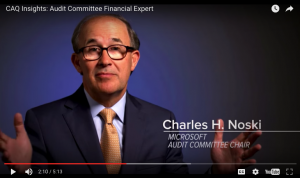- All S&P 500 boards have at least one financial expert.
- At the time of surveying, 69% of S&P 500 boards actually had more than one financial expert.
What Are the Benefits of Having More Than One Financial Expert?
In debating requirements surrounding financial experts, host TK Kerstetter and Fornelli take turns playing devil's advocate. Together, they reach the consensus that having more than one financial expert is a best practice for today's audit committees. Among the benefits:1. Shared responsibility.
As we've recently discussed, today's audit committees have more on their plates than ever before. Thus, the prospect of audit oversight falling onto a single financially-savvy person has become somewhat unrealistic. Given the complexity of today's companies, best governance practices suggest that more than one financial expert should share the responsibility of oversight. In fact, a recent report found that 27% of S&P 500 audit committees were comprised solely of financial experts.
2. Flexibility to fill various roles.
As board governance disciplines become increasingly multiplex-think cyber risk, enterprise risk management, compliance and regulation-the board as a whole needs the flexibility to place certain people on the audit committee at specific points in time. Having more than one financial expert allows the board to move skill sets around depending on what audit issues arise. In short, Fornelli said, the answer from audit committees seems to be: We don't want it to be required that we have more than one financial expert, but we SHOULD have more than one.
3. Smoother succession planning.
Ideally, the succession of the audit committee chair is a process of long-term planning and orderly execution. However, at times, the board can find itself scrambling to fill that position-a state of panic that is often mediated by having more than one financial expert on the board. Recently, we discussed how boards should be approaching the mentorship process for audit committee chairs, which allows them to be prepared even in times of uncertainty.
Is the Definition of a 'Financial Expert' Robust Enough?
Host TK Kerstetter raises a valid question: Have some companies taken too much liberty in defining a 'financial expert'? The definition put forth by Sarbanes-Oxley is rather broad. In CAQ's research, they spoke with audit committee chairs from Microsoft, Walmart, and other leading companies across the globe. They found that, in general, audit committee members felt that the Sarbanes-Oxley definition of a ''financial expert'' provided the right amount of flexibility, allowing each board to set their own parameters in terms of specific skill sets and number. Diving into those parameters, the CAQ interviewed several prominent audit committee chairs as part of a special video series.
For example, Walmart's Timothy Flynn describes the varying professional backgrounds and experiences from which a 'financial expert' can be developed. Microsoft's Charles Noski explains that, in addition to understanding auditing and financial reporting, a financial expert must be able to ask the tough questions of management and independent auditors.
In the end, developing the definition of a financial expert and determining the appropriate number is a whole-board responsibility, explains Fornelli. The gravity of today's financial expert role is immense, and the most successful boards are the ones that view the financial expert requirement as a shared duty.
Diving into those parameters, the CAQ interviewed several prominent audit committee chairs as part of a special video series.
For example, Walmart's Timothy Flynn describes the varying professional backgrounds and experiences from which a 'financial expert' can be developed. Microsoft's Charles Noski explains that, in addition to understanding auditing and financial reporting, a financial expert must be able to ask the tough questions of management and independent auditors.
In the end, developing the definition of a financial expert and determining the appropriate number is a whole-board responsibility, explains Fornelli. The gravity of today's financial expert role is immense, and the most successful boards are the ones that view the financial expert requirement as a shared duty. 
Environmental, social and governance (ESG) issues have become more complex and multifaceted than ever before. At the same time, ESG continues to ascend on board and leadership agendas.
In this buyer’s guide, we explore what a market-leading ESG solution should look like and highlight the key areas organisations should be prioritising as they embark on their search.




